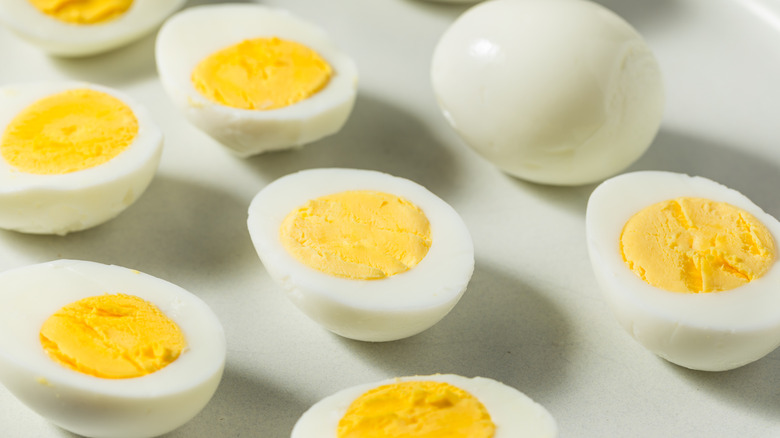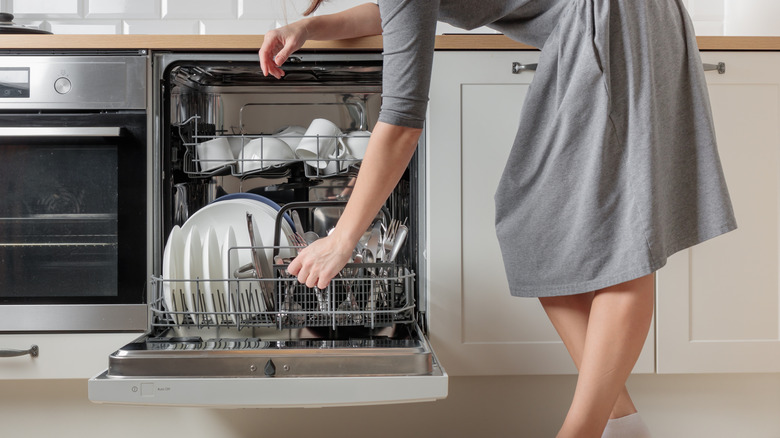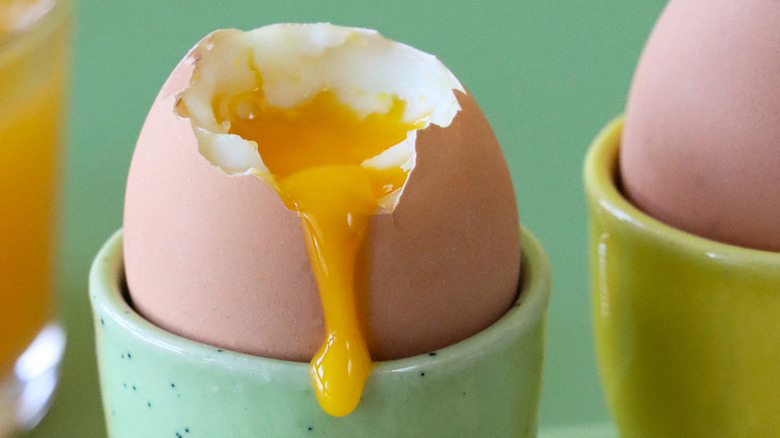Here's What Happens When You Boil Eggs In A Dishwasher
Boiling eggs sounds perfectly simple. But anyone who has actually attempted to do it, maybe for a marinated egg recipe to top ramen or to serve alongside avo toast, knows it can be frustrating. Waiting for the water to boil, and then having to clean the pan afterward, can feel like more trouble than it's worth. So it's no surprise that some people have come up with creative, slightly unconventional hacks for boiling their eggs. One example is using a dishwasher. Yep, you can actually boil an egg while running a normal wash cycle.
Dishwashers don't boil eggs in the traditional sense, instead using a combo of hot water and steam to heat the eggs slowly. In a TikTok video, one user demonstrated that you can, technically, boil an egg in the dishwasher. After placing it on the toughest cycle for three hours, the egg did come out soft-boiled, but the yolk seemed to have cooked more thoroughly than the white. In another video posted on YouTube, an experiment using a two-hour wash showed mixed results: eggs on the bottom rack fared the worst, the top rack did slightly better, and the experimenter's middle rack delivered the most even boil, with larger eggs cooking better.
One notable difference we can gauge between traditional and dishwasher boiling is the yolk and white consistency. This could stem from the fact that — obviously — dishwashers aren't designed to boil eggs, and the temperature changes during the cycle as opposed to a steady boil. Also, as dishwasher water is not boiling hot (it's around 125 to 175 degrees Fahrenheit), a boiled egg can take up to three hours, whereas using the traditional method should only take seven minutes at most for a jammy center.
Is boiling eggs in a dishwasher actually safe?
Boiling eggs in a dishwasher might seem like a quirky kitchen hack, and while it technically works (with mixed results), it's not the safest or most hygienic of methods for boiling your eggs. To put it straight, dishwashers are designed strictly for cleaning, not for cooking.
During a normal wash cycle, food particles, grease, and detergent residues are circulated throughout the machine. Combine these with the moisture of the dishwasher, and you've got yourself the perfect environment where bacteria and biofilms (communities of bacteria and fungi) can thrive. In addition, dishwasher detergent is harmful if consumed. Even if you clean your dishwasher regularly, potentially harmful microbes like E. coli can still be present. This means that placing your eggs directly in the dishwasher could potentially expose you to cross-contamination. So if you're using the dishwasher method, it's essential that you take appropriate measures to ensure your safety.
The most effective way to prevent cross-contamination is to fill up a container or a zip-lock plastic bag with water. This setup reduces the risk of contamination and also cushions the eggs against the dishwasher's high water pressure. Without protection, the eggs are likely to crack, which will not only ruin their texture but could also further expose you to harmful bacteria.
Other unconventional ways to boil eggs.
Although the traditional way to boil eggs is boiling water on a stove, there are several unconventional yet effective ways to achieve the same results with less hassle and cleanup.
One modern alternative is using an air fryer. You might wonder how this handy machine actually boils eggs since it doesn't use water. Instead, it circulates dry heat, which cooks the eggs in a way that mimics boiling. To achieve a jammy, medium-consistency, preheat the air fryer to around 350 degrees Fahrenheit, and cook your eggs for around 10 minutes. For hard-boiled eggs, extend the cooking time by a few minutes. This method is great for cooking several eggs at once, as long as your air dryer basket has the space for them to be spread evenly. Once they're done, make sure to transfer the eggs to an ice bath for about 5 minutes. This halts the cooking process and preserves the desired texture, and helps to make the dreaded peeling process much more manageable. If you want to make it even easier, Gordon Ramsay has a trick: Just crack the eggshells lightly before you cool them.
Another slightly more unconventional method involves pairing your eggs with a drip coffee machine. Instead of brewing a pot of coffee, simply place your eggs directly into the empty glass carafe, making sure it's well-washed to prevent a coffee-egg fusion taste! Fill the water reserve with enough water to completely submerge the eggs, and set the brewing cycle. The boiling water will gradually cook the eggs, and the drip machine maintains a steady temperature. Once fully submerged, time your boil depending on your desired doneness. This hack is useful for boiling eggs when you may not have access to a kitchen, like in the office or at university.



